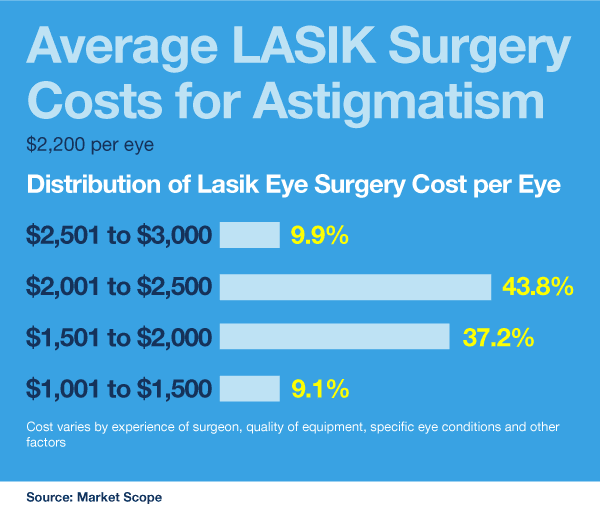
Medically Reviewed by Angelique J. Pillar, M.D. NVISION Surgeon
How Much Does LASIK Surgery for Astigmatism Cost?
Home / LASIK for Astigmatism /
Last Updated:

Medically Reviewed by Angelique J. Pillar, M.D. NVISION Surgeon
LASIK surgery is designed to improve your vision, so you will not need to wear glasses or contact lenses all the time. LASIK can be an effective surgery for people with astigmatism, but to get the best results, your surgeon might need to take a few extra steps. LASIK surgery typically costs thousands per eye, and those extra steps needed for astigmatism can drive costs up.
You might be tempted to schedule with a doctor that offers bargain pricing, but that may end up costing you more. In most cases, your insurance plan will not cover the entire cost of surgery, but some plans can provide you with discounted care.
Table of Contents

What Makes LASIK for Astigmatism Different?
Vision difficulties begin with improper focus. In order to see images clearly, light rays must move through the eye and converge on the back of the eye. If you are nearsighted, rays converge in the middle of the eye. If you are farsighted, rays converge behind your eye.
LASIK involves removing a specific amount of tissue, so rays converge in the proper spot.
You deserve clear vision. We can help.
With 135+ locations and over 2.5 million procedures performed, our board-certified eye surgeons deliver results you can trust.
Your journey to better vision starts here.
If you have astigmatism, your vision issue is slightly more complex. Your eye has irregularities in shape that make parts of your visual field seem fuzzy or out of focus. This is a common problem, according to Medscape, as about 44% of people have more than 0.5 diopters of astigmatism.
In some people with astigmatism, the eye is shaped like a football rather than a baseball, and that unusual curve causes blurred vision. But some types of astigmatism involve small irregularities in shape in only one part of the eye. Those irregularities cause the blurring to take hold.
People without astigmatism may have relatively simple LASIK procedures. Their doctors determine a certain thickness of tissue to remove, and that tissue is removed in one clean slice. Since some types of astigmatism involve irregularities in shape in only part of the eye, surgery to correct the issue tends to be more precise.
As an article in Current Opinion in Ophthalmology explains, treatment of astigmatism usually involves applying the laser in a zone-by-zone format, so the small irregularities can be removed very precisely. Doctors can use specialized equipment that maps the surface of the eye, and that topographic map can help them plan for the very detailed correction that leads to better vision.
In a study comparing surgery with mapping to surgery without mapping in patients with astigmatism, published in Ophthalmology Times, researchers found that 100% of those treated with mapping had 20/20 vision a year later compared to 81% of eyes that had surgery without mapping. It is clear that this type of surgery can provide superior vision for people with astigmatism.
After surgery, it is not uncommon for people to experience symptoms of dry eye. They may feel as though their eyes are:
- Gritty
- Itchy
- Blurred
- Painful
Research published in 2007 in Review of Ophthalmology suggests that these symptoms tend to fade four to six months after surgery. In this article, doctors suggest that “new” eye drops and therapies made dry-eye recovery easier than it had been in years past. These therapies may no longer be considered new, but they are still powerful in helping you to recover from surgery.
LASIK Surgery Costs Thousands
On average, according to an expert quoted by Michigan Health, LASIK surgery costs about $2,200 per eye. When compared to the cost of glasses and sunglasses, or the cost of purchasing and maintaining contact lenses, this price can seem reasonable or even low.
But unlike lens costs that are spread out over months or even years of maintenance, LASIK surgery costs come all at once. That price can be hard for some people to pay.
Traveling to a different part of the United States does not tend to lower costs. Back in 1999, CNN reported that costs do not vary across the country. A brief search online confirms that this remains true today. If you were hoping to head to a different coast to find a lower price, that is unlikely to be effective.
There are additional factors that can make the cost of surgery rise even more. According to vision insurance provider VSP, a doctor with a significant amount of expertise in performing LASIK surgery might charge more for the procedure. Doctors who use advanced technology, such as the advanced equipment needed to perform LASIK surgery for people with some types of astigmatism, might also charge more.
Most surgeons will give you an estimate for the cost of surgery before you schedule, so you can understand how much to set aside for the bill. But given the research we’ve demonstrated here, you should expect to pay thousands to get the surgery you are hoping will clear your vision.

Bargain Pricing May Cost You More
ome surgery centers offer seemingly low prices on LASIK surgery. You may see billboards and ads in your community that suggest you can have the surgery you want for hundreds of dollars rather than thousands.
As the American Refractive Surgery Council points out, these bargain prices may not include the full cost of your care. The advertised price may include the surgery itself, but it may not cover the cost of the following:
- Your preoperative screening exam
- Advanced technologies, including mapping
- Astigmatism correction
- Aftercare
- Additional corrections if your vision does not clear
All of these fees can add up, and these are not fees you can avoid. You will need a screening exam before surgery, for example, so your doctor will know which issues need to be corrected. Skipping that step means skipping surgery altogether.
If fees come with steps that cannot be skipped, the price you may pay with a bargain vendor could be higher than the price you would pay with a reputable clinic that offers flat pricing for the entire procedure.
You deserve clear vision. We can help.
With 135+ locations and over 2.5 million procedures performed, our board-certified eye surgeons deliver results you can trust.
Your journey to better vision starts here.
Can Insurance Offer You Free LASIK?
Glasses and contact lenses can help you to see clearly even if you have astigmatism. The American Refractive Surgery Council suggests that health insurance companies rely on this fact when they are determining vision benefits.
Since glasses and contact lenses do a good job of correcting vision, they reason that they do not need to offer benefits for LASIK surgery. If you cannot see clearly, they explain, glasses and contacts should be your next step.
Since insurance companies such as Cigna consider LASIK to be a cosmetic procedure for those who do not wish to wear glasses or contacts, the surgery is rarely (if ever) paid for in full by insurance. However, there are some insurance options that can help to drastically lower your costs.
VSP suggests that some plans offer laser surgery benefits, and those benefits can be used to offset the cost of the surgery. The benefits can differ by plan type, so people with this insurance would need to investigate their plans before signing up for surgery, but it could be a good option for some.
Some health insurance plans, including one offered by Blue Cross Blue Shield, provide discounts with preferred LASIK providers. These discounts allow you to take a certain percentage off the cost of care for your surgery as a perk of being a member of this specific insurance plan. This could be another way to save money on the surgery you would like to have for your eyes.
But in all of these instances, you are likely to be asked to pay at least some of the cost of care. Your insurance coverage may help to offset those costs to some degree, but you will have a portion of the care to cover yourself.

We believe every patient should have access to the life changing procedures NVISION® offers. Since LASIK is considered an elective medical procedure or advantageous to the patient but not urgent, it is typically not covered under insurance plans. Our financing options ensure that you are not held back by cost. Read on to learn more about CareCredit®, FSA/HSA, Insurance Discounts and other options.
Learn More
We Can Explain Your Options
Deciding whether or not to have LASIK surgery is not just a question of eye health. It is also a question of budget. We can help you to make the right decision for your eyes and your finances.
Our doctors perform examinations before surgery, and they can help to explain the risks and benefits of surgery so you can make an informed choice. We can also help to explain our budget options, including payment plans, so you can stretch the cost out over a period of time.
We are happy to take all the time you need to help you understand what is coming and what is right for you. Contact us to find out more about how we can help.
You deserve clear vision. We can help.
With 135+ locations and over 2.5 million procedures performed, our board-certified eye surgeons deliver results you can trust.
Your journey to better vision starts here.
References
- LASIK Astigmatism. (March 2017). Medscape.
- Astigmatism and LASIK. (August 2002). Current Opinion in Ophthalmology.
- Topography-Guided LASIK Rivals SMILE for Myopia, Myopic Astigmatism. (March 2018). Ophthalmology Times.
- 20/20 and Unhappy After Refractive Surgery. (November 2007). Review of Ophthalmology.
- Pros and Cons of LASIK: Are Risks Worth the Cost? (December 2017). Michigan Health.
- Evaluating Options: Finding Dr. Right. (August 1999). CNN.
- Glasses, Contacts, and LASIK: How Much Does LASIK Cost? VSP.
- Evaluating a LASIK Bargain: 4 Facts You Need to Know. (March 2016). American Refractive Surgery Council.
- How Insurance Covers LASIK and Other Vision Correction Procedures. (July 2017). American Refractive Surgery Council.
- PRK, LASEK, and Epi-LASIK for Nearsightedness. Cigna.
- Glasses, Contacts, and LASIK: Does Your Insurance Plan Cover LASIK? VSP.
- Laser Vision Correction. Blue Cross Blue Shield Federal Employee Program.

Angelique J. Pillar, MD is a fellowship trained and board certified ophthalmologist specializing in cataract, cornea, and refractive surgery.
This content is for informational purposes only. It may have been reviewed by a licensed physician, but is not intended to serve as a substitute for professional medical advice. Always consult your healthcare provider with any health concerns. For more, read our Privacy Policy and Editorial Policy.
